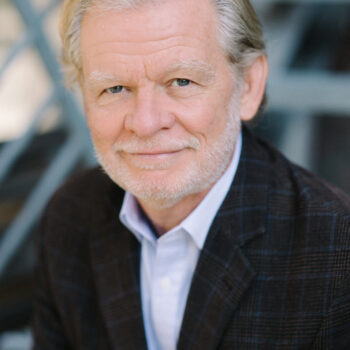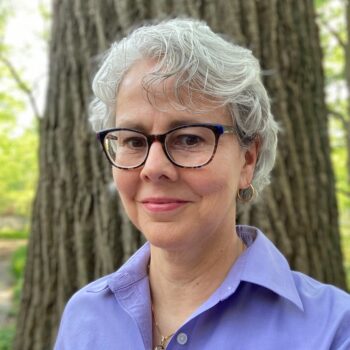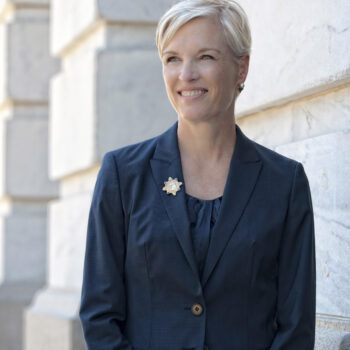Gara LaMarche sat down with Cecilia Muñoz — a senior advisor at New America and the former head of the policy shop at the National Council of La Raza (now UNIDOS US) — along with former Planned Parenthood Federation president Cecile Richards, to talk about their experiences sitting on foundation boards, how philanthropy’s relationship to organizing is shifting, and the most promising innovations they’re seeing in the field right now. The transcript of this interview has been edited and condensed.
Gara LaMarche: When you first joined the foundation board, what was [it] that you were asked to do? Did you have any reservations? And what did you find that was surprising or different than you might’ve expected?
Cecilia Muñoz: Well Gara, when you come from the nonprofit sector and a foundation asks you to do something, you generally say yes, right? Because it’s part of the relationship building that you need to do in order to position your own work to be able to survive and move forward. I was not at all sure I wasn’t going to be a fish out of water. At the time I was at what was called the National Council of La Raza. I had knowledge of my own community, the Latino community, and knowledge of the nonprofit sector as a grantee, but I was frequently the only person with that kind of experience in the room. And I’m on a bunch more philanthropy boards now and sometimes that’s still the case.
But obviously the skill set and the knowledge of constituency and knowledge of movement and how to move things forward turns out to be really useful on a foundation board. Because the board members themselves are not so much in the grant-making business. But we do tend to be in the strategy business. Helping foundation leadership set a core direction and maybe even a set of metrics of what they want to accomplish is important. And the more knowledge you can bring about what the tools are that help you accomplish that, the better. But at first I wasn’t at all sure that was a skill set that would transfer.
Cecile Richards: I joined the Ford Foundation board about ten years ago. And the Ford Foundation has always had some mix of practitioners and other experts, and I guess like Cecilia said, when a foundation asks you to do something, the answer is yes. And in this case it was a really, really exciting opportunity because some people are not sure what organizing is and other people are not sure what philanthropy is. It’s sort of interesting to sit in those spots where you almost can feel a little bit like a translator for the other.
For me, it’s been extraordinarily humbling. One of the things I feel like I’ve learned is just how hard good grant making is. When you’re always on the receiving end, you have an idea of, why isn’t this happening? Why isn’t that happening? And I do think I’ve learned a lot about just how challenging it is, particularly if you’re putting a stake in the ground. And then you realize, wow, it may seem like this foundation has a lot of resources, but they’re trying to take on really big problems. And there isn’t a single answer. So, I hope I’ve learned to be a little more humble about just how hard it is to do this really well, to hold yourself accountable as a foundation to recognize the things you did that really worked and those that didn’t work and that that’s okay. Because if you aren’t making mistakes, you’re probably not trying hard enough.
GL: Have either of you [gotten] attention because you come out of the field, or to some extent are still in it, and people expect that somehow you might be a route to the foundation?
CM: If you are trying to move forward on an issue, and you’re trying to develop a fundraising strategy, one of the things you look at is who’s on which board. And it turns out to be a terrible strategy because it’s explicitly not a board member’s job to interfere with what the staff is doing and engage in individual grantmaking. Because of the work that I do, I can see a connection between the really exciting higher-end work that’s happening at a foundation whose board I sit on and some people who are doing really cool stuff and know that they should be talking to each other. But I go out of my way to always copy the foundation president and [say] this is a connection I thought might be useful, but no obligation, I won’t be offended. Because it’s important to honor the staff’s role and to not, as a trustee, micromanage.
I have also found that you tend to respond to strategic plans and provide insights and advice. This last year, because of the uprising in response to George Floyd’s murder, because of this moment of the pandemic and the economic crisis and the crisis in racial justice, there was room for conversations about what aren’t we doing to meet the moment. And it is possible to take advantage of opportunities like that to really focus your fellow trustees in a foundation. Like, is business as usual the right approach here, or is there something else we should be doing? And you saw a lot of foundations stepping up and shifting their strategies in response to what’s going on in the world.
CR: Foundations are just by their DNA thoughtful, slow moving, sometimes ponderous. And it is interesting to sit on a board where you’re in the thick of some of the work that’s happening. And I hope that’s a valuable role that those of us who’ve come out of organizing and advocacy can play to call out that the house is on fire.
GL: I’ve only worked as a staff member for living donor foundations, and [Chuck] Feeney and [George] Soros were quite different from one another, but we had an activist orientation and could move fairly quickly. Each of you serve on both living donor boards and more traditional trustee boards. Do you notice any difference there in terms of responsiveness and nimbleness?
CM: The challenge of working with the living donors, obviously, [is] that’s where the buck literally stops. And so it’s a little bit less predictable. The thing about a more institutionalized foundation is that they generally fall back on practices that they’ve established over time, expertise that they’ve established over time. Sometimes that can make them less nimble. It can also make them more expert. And I’ve seen the whole range. But it’s really important to have your eyes open to current circumstances and not assume that because a certain foundation has been doing things a particular way or has great expertise on issue X, that that means that the way they’ve been doing it really is the right way.
At times, I deeply valued the expertise that foundation staff develop. They really become experts in a field and, if they’re driving a field forward successfully and it’s being done skillfully and respectfully, it can be an extraordinary catalyst. It can also be, and I’ve experienced this as a grantee, an obstacle. Being authentically engaged with the community, the people whose lives you’re also trying to influence, is a really essential ingredient. And it’s easier for some foundations than others.
CR: I sit on two foundation boards. They’re very different. One is very long established; the other is newer and less out in the public eye. But they both actually have been, I think, incredibly responsive to current events. A lot of foundations were established when things moved more glacially. We are living in an era when change is happening so rapidly — whether it’s because of technology, growing inequality, ongoing racial unrest. These are not [areas where] you can spend two years making a strategic plan if you’re actually going to be helpful in the moment.
Foundations, of course, care about their reputation and their legacy. But I have been really moved at how willing foundations have been to take risks. I was really interested when Ford began taking some of their assets and trying to make strategic investments to better the causes they cared about. And I began to see that ripple to other foundation boards — looking at the makeup of the board, thinking about what [to] do in a moment of crisis and making big bets, doing more general support.
GL: I always felt that among my jobs as the CEO was to translate between the field and more establishment boards. I’m curious [if] you find yourself playing that role. With people who don’t come from the same place that you do, corporate types and so forth, what works? What kind of arguments have you found effective?
CR: Ford was a big funder of health care delivery for Planned Parenthood, and that was great. We built a number of health centers in the deep South with the support of George Soros and the Ford Foundation, among others. But funding efforts to actually make a big bet and change public policy [through the ACA] did more [to make] birth control and healthcare available for literally millions of people in this country. More than any clinic that we could ever build.
You almost have to have the healthcare delivery system that we had at Planned Parenthood and match it up with the grassroots organizing. I still try to explain to folks that, yes, you could build clinics and provide care, but when you can get seventy million women birth control at no cost, that actually is going to have a generational effect. The more we can break it down into simple pieces, finally the tumblers fall in place and you have systems change.
CM: Exactly. Sometimes it’s breaking down the pieces, but almost always, it’s making the connection between organizing and the result. Which you just did in describing tens of millions of people [who] got health care as a result of this combination of service and advocacy. And I think as a trustee, one of the things you can do as someone who comes from a movement is make that connection so that others who maybe are a little afraid of advocacy can see the return on investment that you can get.
GL: Is there ever a time when you have to think twice about how to use your voice and be less critical than you might’ve been?
CM: I can’t say that I’ve ever felt like I was in a situation where I couldn’t be critical, at least so far. And in fact, as a participant in the system, I think it’s actually really important to be able to be critical of the sector and make sure that it is functioning [in] as accountable a way as possible and as effective a way as possible.
CR: I completely agree with Cecilia there. I’ve never felt that I couldn’t speak my mind, but maybe because I didn’t think first. Oftentimes, people who sit on the boards of foundations, they’d like to have more of a point of view about organizing and advocacy and grassroots, but these are like two different worlds. And I know one of the trends I have certainly seen at Ford is to provide more long-term general support for organizations and leaders. And, as opposed to making people jump through a bunch of hoops, sometimes just saying, we believe in you, we trust what you’re doing. You probably know better than we do. I really appreciate this move, which I think is happening more, to recognize that sometimes philanthropy’s job is to just give the money to people that you believe are doing good work and trust them to do it.
CM: Amen.



